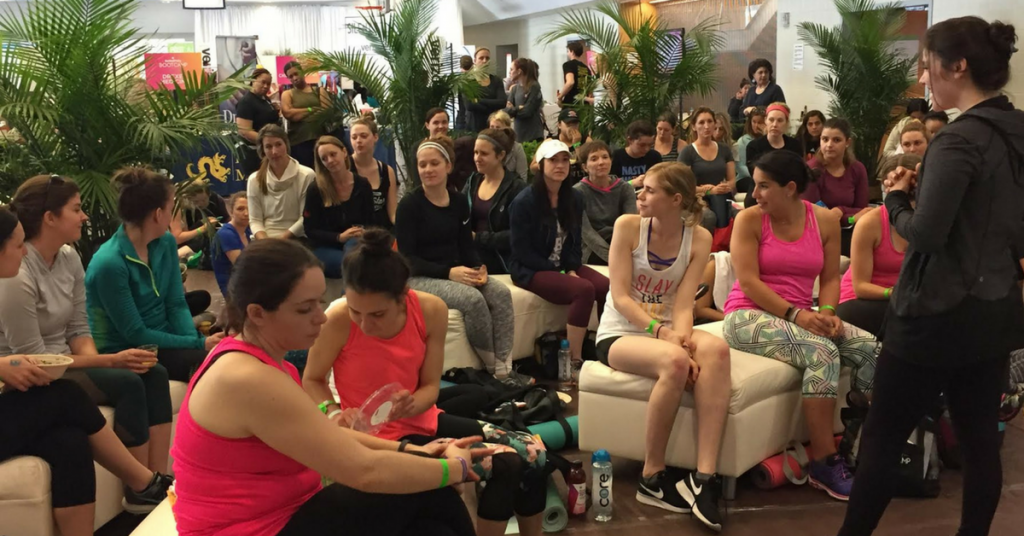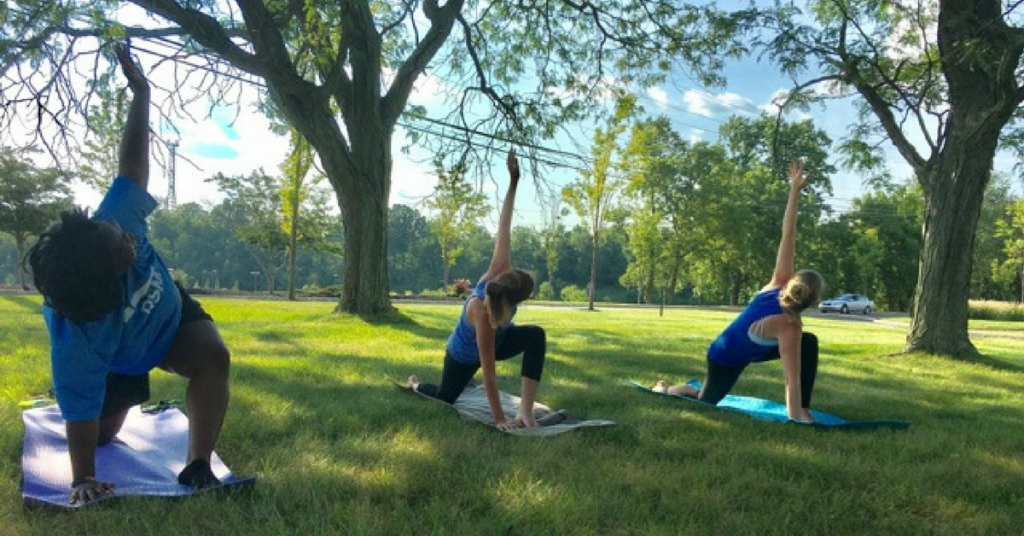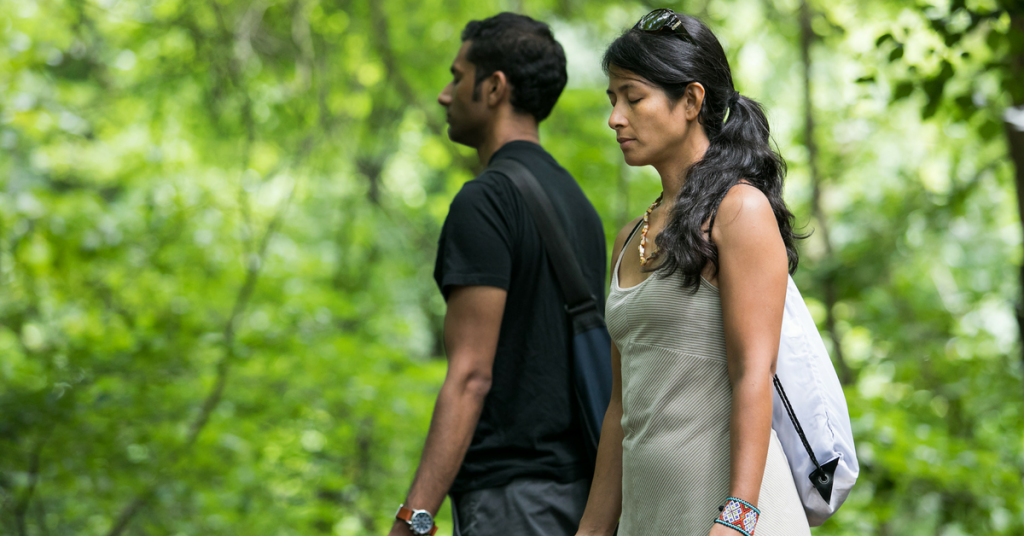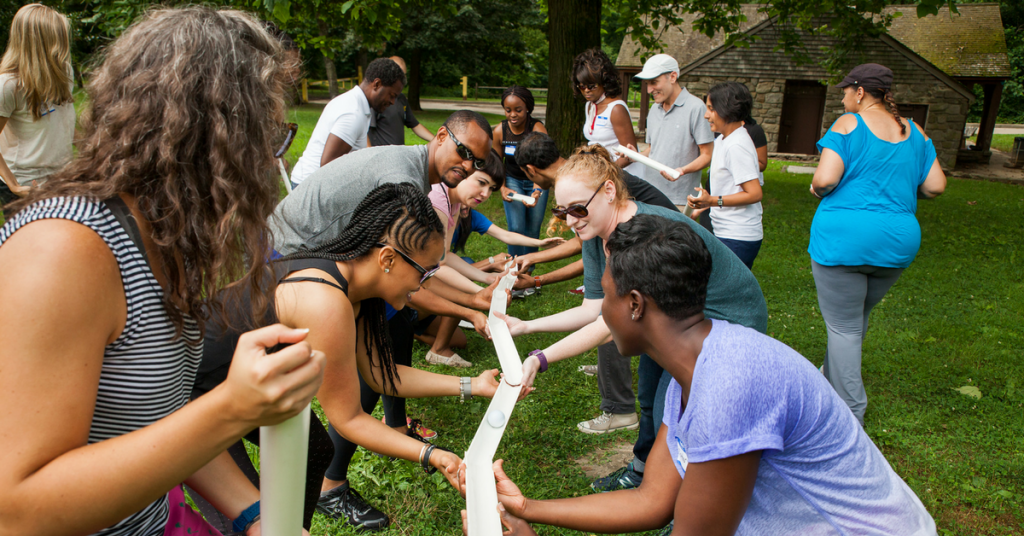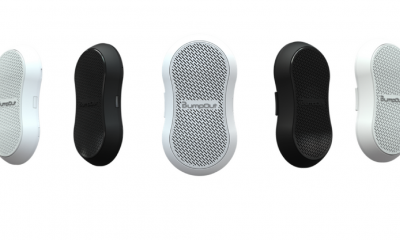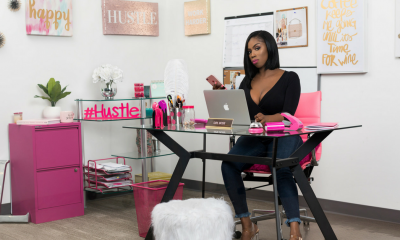Business
Anna Greenwald of On The Goga Believes Health Culture Is Good Business
Published
6 years agoon

Anna Greenwald is the founder and CEO of On the Goga, a company that specializes in helping corporations focus their corporate culture on mindfulness and wellbeing. On the Goga offers a variety of services like corporate yoga, meditation, nutrition workshops, company retreats, and more. Anna Greenwald has built a mobile corporate yoga studio that takes care of all their clients’ corporate wellness needs. Her holistic approach has brought her clients like L’Oréal, Drexel University, and the Philadelphia Eagles. She uses evidence based practices that increase employee well being, creativity, and productivity.
What inspired you to become an entrepreneur in the corporate wellness sector?
I came into this sector completely by accident. I trained most of my life as a classically trained singer. When I was a sophomore in college, I got a vocal injury that prevented me from talking or singing. To help recover, my voice teacher recommended I do anything possible to relax my muscles including yoga. I had never tried yoga before – in fact, I hated the idea of it – but that first class in a small studio in West Philadelphia changed my entire mindset. Within a year, I was practicing 4-6 times a week and the practice changed my mind and body. It helped me realize so much about myself and what I’m capable of. I wanted share that experience with others, and from that came the original idea for On the Goga: make yoga and mindfulness accessible to people who wouldn’t normally go to a yoga studio.
What was your biggest challenge in founding On The Goga and how did you overcome it?
The biggest challenge in founding On the Goga has been to discover exactly how to present yoga and mindfulness to individuals who haven’t already experienced its benefits. Even I only tried it when I was told it would help my singing. In actuality, yoga is the physical practice of mindfulness, and mindfulness is simply the practice of noticing what is happening right now. This can apply to sweating it out on a yoga mat, or noticing the temperature of the cold beer in your hand when you’re at a happy hour with coworkers. So we teach yoga and mindfulness both ways now. We meet people where they are in terms of physicality level and interests. We teach the tools of mindfulness through traditional yoga, mindful happy hours, hikes, retreats, cooking classes, and more.
What, if any, connection exists between productivity at work and yoga in your opinion?
Yoga improves employees performance through improving their mental and physical health. But since all of our programming is research-based, rather than give you my opinion I’ll share some research on the subject:
- “In a randomized study of employees from a British government authority… in comparison to the control group, the yoga [group’s] scores were significantly lower for perceived stress, back pain, sadness and hostility, and substantially higher for feeling self-assured, attentive and serene.” – Journal: Occupational Medicine (Lond), 2012
- “Yoga practices improved neural performance and reduced fatigue and stress level. Yoga reduced rescue medication use in bronchial asthma, and achieved the reduction earlier than conventional treatment alone. Yoga produced a reduction in resting pulse rate, systolic blood pressure, diastolic blood pressure, and mean arterial blood pressure irrespective of age, gender, and BMI.” – summarized from an article in the North American Journal of Medical Sciences 2012
- After a 6-week yoga intervention for a randomized group of employees, “The yoga group reported marked improvements in feelings of clear-mindedness, composure, elation, energy, and confidence. In addition, the yoga group reported increased life purpose and satisfaction, and feelings of greater self-confidence during stressful situations.” – Summary and excerpt from the Scandinavian Journal of Environmental Science, 2011
What kinds of benefits can a business expect from participating in On The Goga classes?
We look at wellness as a form of professional development. In fact our driving principle is: Happy People Do Great Things. Each one of our programs are designed to make every employee feel cared about and supported, in turn increasing their loyalty to their company and pride in their work. We are also helping employees to learn sustainable habits of wellness that improve their performance at work and physical health over time. It’s a win-win situation for employers and employees. What’s the return on this investment? Again, I’ll point to some research sources:
- Happy employees are 3x more creative, 31% more productive, and have 37% better sales – Harvard Business Review, Positive Intelligence, 2012
- “Highly engaged teams… saw significantly lower turnover (25% in high turnover, 65% in low turnover organizations).” – Gallup, 2013
On an individual level, mindfulness has been shown to achieve the following benefits in as little as 10 sessions:
- DECREASE STRESS LEVELS – Source: “What Are The Benefits of Mindfulness,” a Meta Analysis from American Psychological Association, 2012
- INCREASE FOCUS – Source: “Meditation, Mindfulness, and Cognitive Flexibility,” The Journal of Consciousness and Cognition, 2009
- LOWER OVERALL ANXIETY – Source: “Short-Term Meditation Training Improves Attention and Self-Regulation,” PNAS, 2007
- REDUCE EMOTIONAL REACTIVITY – Source: “Mindfulness Meditation and Reduced Emotional Interference on a Cognitive Task,” Journal of Motivation and Emotion, 2007
- INCREASE QUALITY OF LIFE – Source: Study from Massachusetts General Hospital, 2011
- INCREASE HAPPINESS- Source: “A randomized controlled trial of compassion cultivation training: Effects on mindfulness, affect, and emotion regulation,” The Journal of Motivation and Emotion, 2014
What are some memorable On The Goga milestones, and what developments do you project for this year?
We’ve had the opportunity to work with and for some amazing organizations and individuals so far. Some of our past clients and partners include L’Oreal and Pureology, Philadelphia Eagles players, and The Children’s Hospital of Philadelphia. 2018 is shaping up to be a big growth year for us. We’ve got an amazing team of top-notch coaches, and have forged some tremendous strategic partnerships that are helping us bring our services to more and more companies.
What is one character trait that defines you and why?
Resilience. This is a character trait I have grown over the years through my yoga practice. I wasn’t always as resilient to failure, rejection, or criticism as I am today (and I still work to strengthen this personality trait). Through my yoga practice, I’ve come to realize the beauty of resilience: you don’t have to do well. You don’t have to handle each failure perfectly, each rejection with grace, or each criticism humbly – you just have to try. Over time, if you keep putting one foot in front of the other, you get better at all these things. When you look back down the road, you realize that the only differentiator between you and the people who have dropped off along the way, is that you kept walking.
What are your tips for aspiring entrepreneurs?
My two mottos since the start of this business have remained the same:
- Value courage, not success. You can’t practice success, but you can practice courage, and if you practice courage over and over and over again, success happens.
- The difference between people who do cool shit and the people who don’t, is that the people who do cool shit do it.
Aaditi Tamhankar is a student at the University of Pennsylvania Wharton School of Business. In her free time she can be found cooking healthy food, running, and watching too much Youtube.

You may like
Tips For Starting A Profitable Business
How to Determine Which Social Network Is Right For Your Business
170 Web Design Questions to Ask Your Clients
‘Or Die Trying’ Webseries Empowering Millennials
BumpOut: The Expandable Portable Speaker
Kemetria Lilly Founder of Lilly’s Kloset: 5 Tips for Aspiring Entrepreneurs
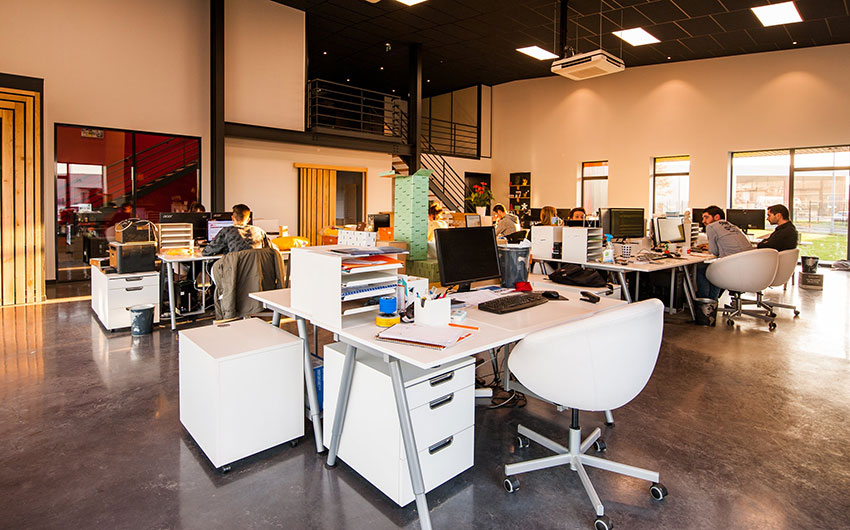
Did you know that your workplace design can impact the productivity of your employees? Aside from this, office design also affects employee safety and health. A study by international architectural firm Gensler in the US states revealed that only 38% of employees strongly agree that their workplace currently provides a great experience, highlighting a major gap between what offices offer today and what employees actually need to perform at their best.
So how does the environment impact the health, safety, and productivity of employees?
Design To Encourage Movements

Our work has a big impact on your health. Most of the time employees spend a lot of time on their desks, so they are becoming sedentary. As we all know, sitting down for long periods of time has adverse effects on our health. In addition, movement offers instant benefits, including cognitive performance boost.
Designing office spaces that encourage movement or walking can help curb these problems for employees and employers alike. There are workstations that are designed to be used in either sitting or standing positions. An open space design also encourages employees to walk from one section of the office to another. Sometimes something as basic as an ergonomically correct chair can help prevent ailments like backaches.
Natural Lighting > Fluorescent

Good lighting can help people see details clearly and increased visibility can help increase productivity. But, this does not mean to say that you can skimp on lighting in the office because a study from Cornell University shows that poor lighting is connected to low production levels and social satisfaction among employees. Many offices are composed of cubicles to give employees privacy to do their work. However, the cubicle arrangement also blocks natural light, which means that some employees are not exposed to natural lighting during an entire work cycle.
Humans are wired to seek natural lighting. In fact, many buildings in Europe encourage exposure to natural light. Employees who had the best views were the most productive and were most likely to describe themselves as healthy.
Dedicated Noise-Isolation Areas

Acoustics is another key contributing factor to productivity. To achieve acoustic comfort, the office must have appropriate acoustic support that is conducive to interaction, confidentiality, and concentrative work. If it is too noisy, workers will not be able to communicate with each other let alone concentrate.
Design your office to have multiple quiet areas where employees can migrate to in order to make calls, have private meetings, or to focus on their work.
Designed With Health In Mind

Aside from these factors, employers should also provide workers with suitable ventilation, access to greenery and the gym to help encourage a healthy lifestyle. Even something as basic as giving them access to increase or reduce the temperature in the office can impact their productivity. Employers should also encourage employees to personalize their workstations so that employees are happier. Workspace design should allow employees to socialize with each other easily while at the same time giving them access to views and privacy so that they can work properly and productively.
Good lighting, comfortable furniture, pleasant color schemes, and access to views or natural lighting can help generate positive energy in the office and employee mood. In fact, 8 out of 10 employees said their working environment affects their mental health.
Featured Image Credit: Photo by CadoMaestro from Pexels

How many entrepreneurs do you know start a company with the intention of failing? We hope that this number is zero, but fail can be the result of a business even if it is unintentional. Serial entrepreneurs know many different ways to fail. This is because success in not guaranteed no matter what business you get into. They also share their tips to avoid failure to help you start a profitable business.
Surround Yourself With The Right People
The phrase “It takes a village to raise a child” also applies to a profitable business. Without talented individuals working for you, it will be very hard to survive. Surround yourself with amazing friends and successful business owners so that you can have access to different skills and knowledge that can help you grow a profitable business and make it thrive.
Build a Strong Foundation
Before starting your business, ask yourself why you’re starting it in the first place. How is your product or service going to help your target audience’s lives better? How does this idea align with your core values? Do you have a solid profitable business plan to make this dream a reality? The answers to these questions will help your business have a strong foundation.
Perfect Your Pitch
You should be able to describe your company in 3-5 words. Think of AirBnB: a place to stay. Describing your business concisely will make it easy to understand. If it is easy to understand, it is also easier to sell. When working on your pitch, stay away from mistakes like using industry jargon that is hard to understand for the layman, asking the wrong questions to those who listened to you, not making the pith relevant to the listener or only talking about yourself.
Know Your Competitors
Keep your enemies close and your competitors closer. They are not the enemy but not knowing what they’re doing could be harmful to your company. Don’t hesitate to use tools to analyze your competition. Tools like SEMrush, SimilarWeb or even Google Alert can help tell you what your competitor is up to and increase your chances of survival.
Build a “Must Have Product”
Sites like Hacker News have a ton of really cool startups ideas. However, if you really want to increase your chances of survival and success, build a must-have-product instead of a nice-to-have product. The difference between the two is easy to spot. The former is a product that is hard to live without while the latter is more disposable.
Build A Company That You Can Scale Independently of Your Staff
It’s better to grow a company that can be scaled using technology and automation. Take Groupon for example that did the opposite. They have a massive staff because they need it to keep new deals flowing everyday and to service their customers. Their company is not scalable because their growth is dependent on the number of staff their hire. This is why their balance sheet is awful.
Find Ways To Keep Costs Low
You can think of cash as your company’s lifeblood and high cost is equivalent to a hemorrhage. Remember that all the cash in the world is not worth anything unless it’s a positive cash flow. Find ways to keep your costs low like going directly to the supplier or negotiating for better prices. Find better ways to finance transactions and ways to work out deals.
Focus on Sales and Marketing
Nothing happens in business unless a sale is made. From the start, find ways to get leads and ways to convert those leads into sales and make sure you are getting repeat sales from your customers. To do this you need an effective sales and marketing funnel that you can work, test and measure.
Always Find Ways To Increase Profits
Don’t rest on your laurels yet. Don’t just be happy with getting customers and making them buy from you. Always find ways to get them to buy more.
Embrace Creativity
Brands like Apple and Ikea stand the test of time because they have followers who are loyal to them. They also differentiated their companies from their competitors by embracing innovation and creativity. Reach out to your employees and don’t be afraid to use their ideas. Launching new products and developing a clever marketing campaign is a good way of retaining that competitive edge your company needs.
Test and Measure
Are your marketing campaigns increasing sales? Is your social media presence helping drive traffic to your website? Testing and measuring everything gives you perspective especially if you want to find ways to increase traffic and keep costs down. Use tools like Google Analytics and Unbounce to help you test and measure marketing campaigns.
Empower Your Staff
No matter how big or small you are, empowering your staff by letting their voices be heard can help boost your profitability. When they feel that they are contributing or when you give them freedom to work, you are making them feel wanted which can greatly affect their productivity and self confidence.
Business
Top 8 Small Business Inventory Management Software for Growth
Published
19 hours agoon
February 12, 2026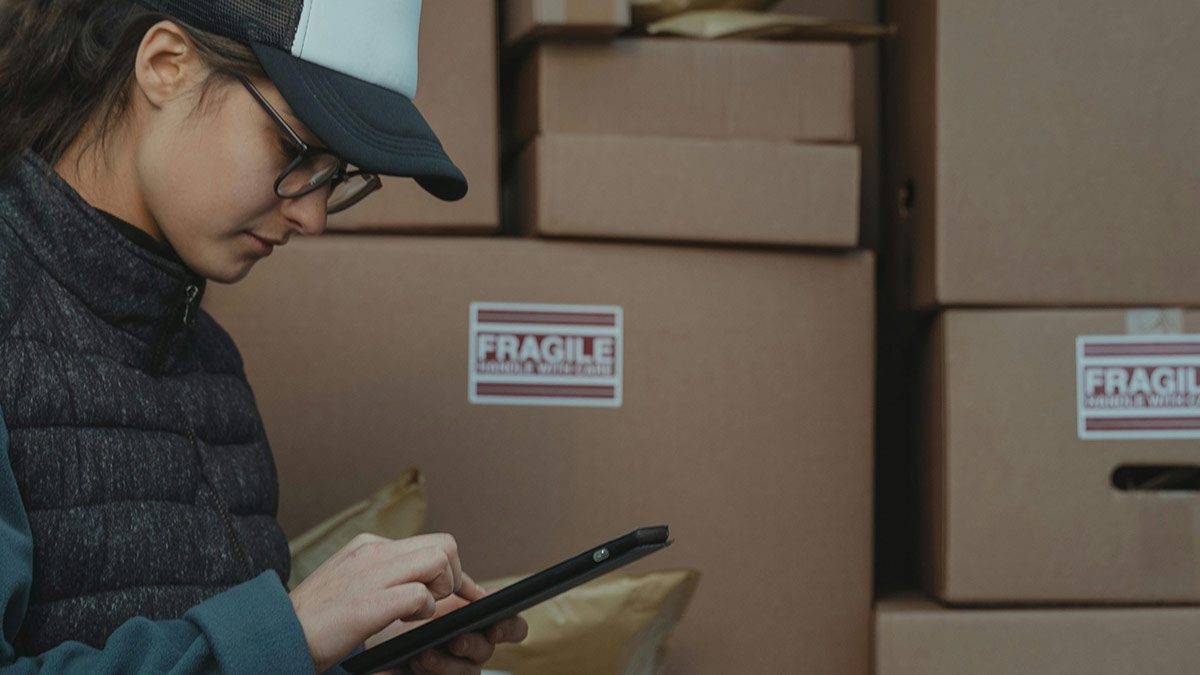
Small business owners have a lot on their plates, having everything working as efficiently as possible. When reducing costs while increasing sales is a priority, you need all the help you can get. This is why a small business inventory management software is a necessity. Here are the top 8:
What is a Small Business Inventory Management Software?
Have you ever found it frustrating to track items or parts throughout your supply chain? Handling the storage, inventory, and sales from manufacturer to wholesaler to retailer can be a Herculean task. This is where small business inventory management software comes in.
This is a tool that automatically tracks how many products or items a business has in stock. It also records and helps monitor how many were sold, returned, or when you should reorder. The most basic software may include accounting tools and point-of-sale systems suitable for small businesses.
The Best Small Business Inventory Management Software
1. Zoho Inventory

A popular choice for small business owners, Zoho Inventory is great value for your money. It allows you to handle multiple ecommerce stores and warehouses. You can check stock levels, manage warehouse items, and fulfill orders.
It features order management, analytics, reporting, and barcode scanning capabilities. It has a free plan with limited features, so if you want to make the most out of the software, the paid plans are highly recommended.
Pros
- Can handle multiple warehouses, currencies, and channels
- Comes with bundling, kitting, and composite tools
- One of the least expensive options
Cons
- No return management feature
- Limited POS integrations
2. FreshBooks

Primarily an accounting software, FreshBooks also has the capabilities of an inventory management software. This is an excellent option for small businesses with fundamental inventory needs. Not only does it enable you to track your items, but it’ll also make accounting easier.
It integrates with many assets and transportation management software, such as 2ship and Barcloud. If you sell in different channels, FreshBooks will come in handy. It automatically gathers data from Shopify or Squarespace for effortless management of your inventories.
Pros
- Easy to navigate user interface
- It comes with excellent invoicing features
- Superb customer support
Cons
- Limited users and clients
- Tier-based pricing is confusing to some users
3. Agiliron
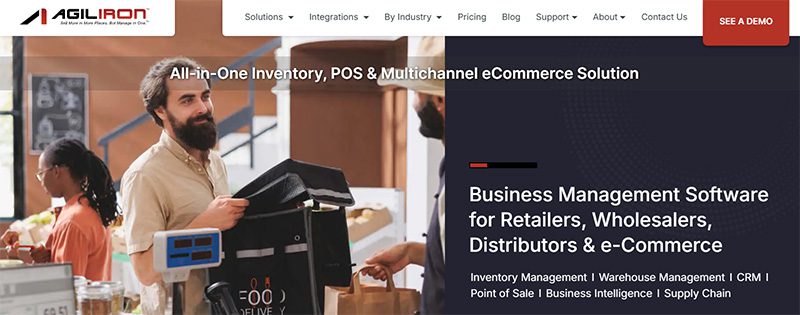
This small business inventory management software is truly cost-effective. Agiliron lets you manage multiple channels with e-commerce, social media, retail, and wholesale features. It will also provide you with comprehensive B2B and B2C inventory, kitting, and many other unique features.
It integrates with QuickBooks, Amazon, Shopify, PayPal, and many other e-commerce-related software and platforms. All its subscription plans offer unlimited orders and 24/7 customer support.
Pros
- Has customer-specific price settings
- International capabilities
- Wide ecommerce applications
Cons
- High learning curve
- Only one user per plan
4. Veeqo
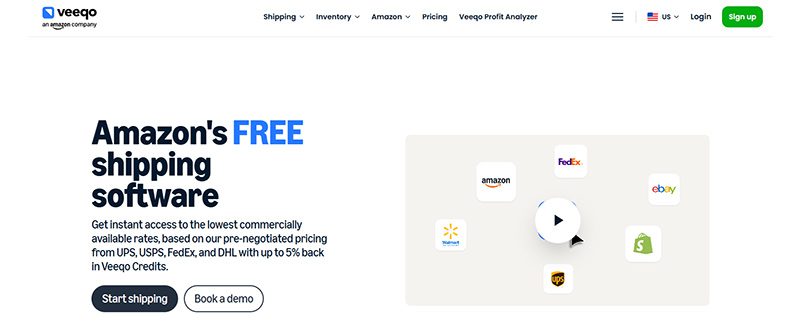
Built explicitly for ecommerce businesses, Veeqo has many features that make inventory and shipping a breeze. It has purchasing, reporting, shipping, and order management tools, whether you have one warehouse or more. Its straightforward platform is centralized to make tracking and management simple and uncomplicated.
One notable feature of Veeqo is its shipping integrations. This includes major shipping couriers such as FedEx and UPS. It has a limited-time, 14-day free trial that lets you try out its service without making a huge commitment.
Pros
- Shipping discounts
- User-friendly interface
- Multi-channel inventory management
Cons
- Some reports of software bugs
- So-so customer support
5. Lightspeed Retail
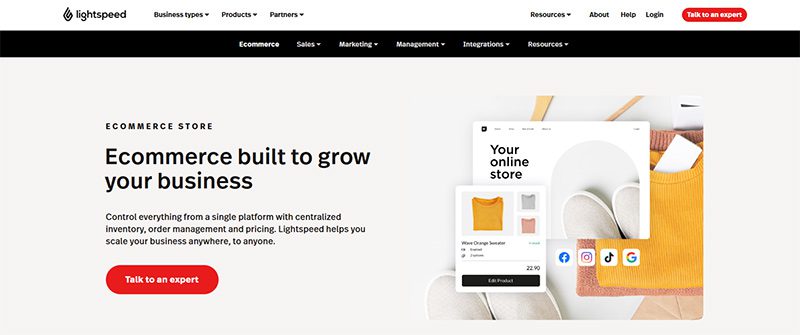
Most popularly known as a point-of-sale software, Lightspeed Rail also has impressive inventory management features. It allows you to conduct sales online or in-store while tracking your inventory levels in real time. This is a very helpful software to have if you’re in the retail industry.
This small business inventory management software lets you select from a wide array of business types, such as apparel, home and gift shops, and many others. Lightspeed will then show you how it can work in your precise retail niche.
Pros
- Offers seamless integration with ecommerce and in-store POS
- Provides advanced reporting on CRM, vendor, and granular inventory
- Unlimited entries across all plans
Cons
- Has no free plan
- No options for managing perishable products
6. Sortly
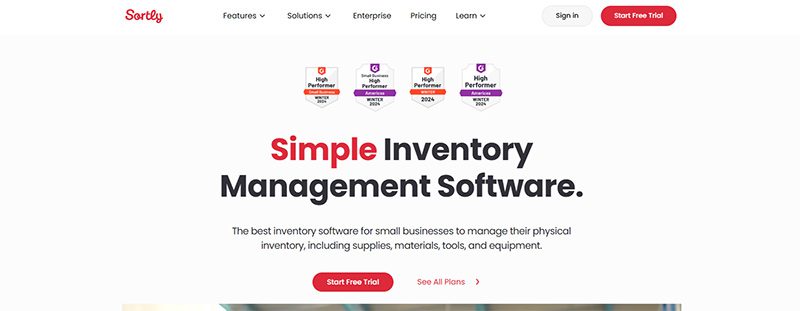
Small non-retail businesses will find Sortly an excellent inventory management software, thanks to its free plan. Well, it’s not only that, this software has many more amazing features to its name. Its intuitive functionality helps new business owners get the hang of tracking inventory and other minute details about their products.
Sortly can help you with warehouse management, inventory control and reports, and barcode scanning, among others. It also enables you to keep track of stock levels and returns through its alerting feature.
Pros
- Reasonably priced premium plans
- Ideal for those starting a new inventory
- Easy-to-use interface
Cons
- Integrating with other apps is for paid plans only
- Customer service may be hard to contact
7. CIN7
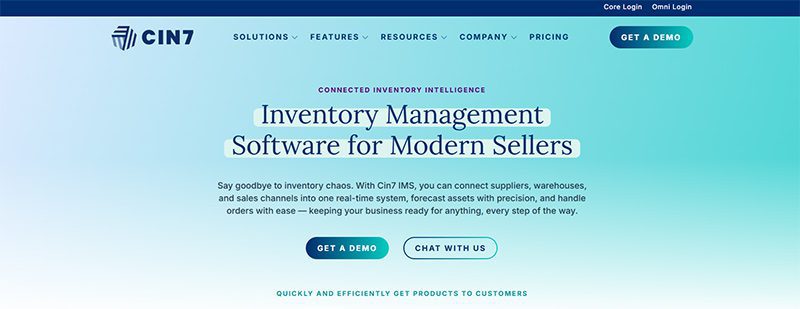
With its robust inventory and multi-warehouse features, CIN7 has become small business owners’ favorite. Among all the small business inventory management software on this list, CIN7 offers the most integrations. It has a return management feature that is essential for ecommerce business owners.
This software offers advanced options for purchase orders, which include duplication, custom fields, and importing and exporting features.
Pros
- Multi-channel, centralized inventory system
- Great workflow automation
- Gives detailed real-time data
Cons
- No free plan
- Android-only mobile app
8. Katana
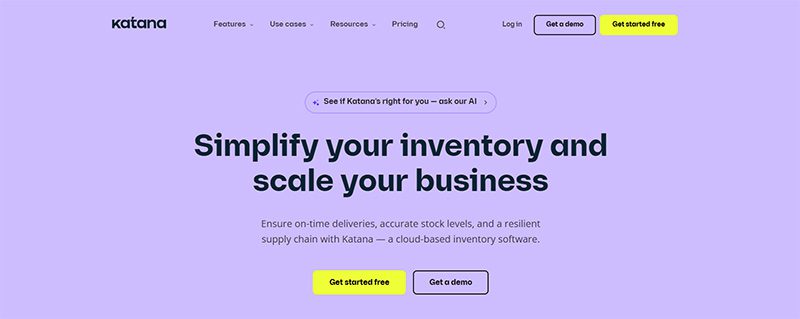
Specifically created for manufacturers, Katana will help you track all your products and supplies at every level of the manufacturing process. Its automatic workflow lets you concentrate on manufacturing. Aside from inventory features, this software will help you with scheduling, production planning and control, and many other tasks.
It has a very low learning curve; you’ll quickly know how to keep track of sales and purchase orders, production receipts, warehouse statuses, productions, and many others.
Pros
- Has inventory control and optimization tools
- Has comprehensive manufacturing shop floor control
- Allows tracking by the expiration date
Cons
- Only has email support
- No mobile app
Honorable Mention
The eight small business inventory management software listed above are our top choices. But there is one outstanding brand that we can’t ignore, so we added it to our honorable mention list:
Megaventory
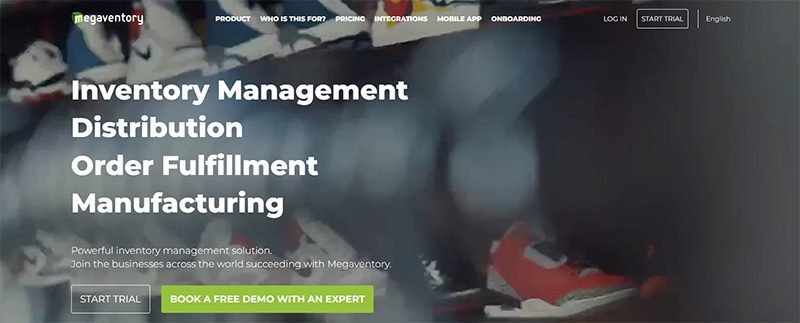
Suitable for small and medium-sized businesses, Megaventory is a cloud-based order and inventory management solution. Its key features include order fulfillment, invoicing, reporting, and manufacturing management. It also offers comprehensive customer support that will help you provide better customer experiences.
Pros
- Alerts you when you are running low on stocks
- Provides automatic calculation of the inventory’s value
- Handles customer and vendor returns without human intervention
Cons
- The dashboard can be hard to navigate on small screens
- The item editor has a high learning curve
Final Thoughts
To find out which small business inventory management software is the best for you, you need to know your inventory tracking needs quite well. After doing so, you can choose from the list above and get the most suitable one for your brand.

Design Hack Your Office For Maximum Productivity

Tips For Starting A Profitable Business

Top 8 Small Business Inventory Management Software for Growth

What’s the Best Logo Design Agency in San Francisco?

What’s the Best Logo Design Agency in Florida?

What’s the Best Logo Design Agency in Texas? Here’s How to Choose

Here are the Best Design Agencies in New Jersey in 2026

Design Hack Your Office For Maximum Productivity

Tips For Starting A Profitable Business

Top 8 Small Business Inventory Management Software for Growth

Top 10 Email Marketing Software Modern Businesses Need Today

The Software As A Service Business Model Explained

The Biggest Hidden Cost in Healthcare Isn’t Staff Time. It’s Operational Friction.

5 Quiet Operational Leaks Costing Fortune 500s Millions
Trending
- Business12 hours ago
Design Hack Your Office For Maximum Productivity
- Business15 hours ago
Tips For Starting A Profitable Business
- Business19 hours ago
Top 8 Small Business Inventory Management Software for Growth
- Uncategorized5 days ago
The Biggest Hidden Cost in Agencies Isn’t Talent — It’s Throughput
- Uncategorized4 days ago
Here are the Best Design Agencies in New Jersey in 2026
- Uncategorized5 days ago
The ‘Boring’ Internal Upgrade Behind Many $100M-Scale Companies
- Uncategorized2 days ago
What’s the Best Logo Design Agency in Texas? Here’s How to Choose
- Uncategorized1 day ago
What’s the Best Logo Design Agency in Florida?
- Business1 day ago
What’s the Best Logo Design Agency in San Francisco?
